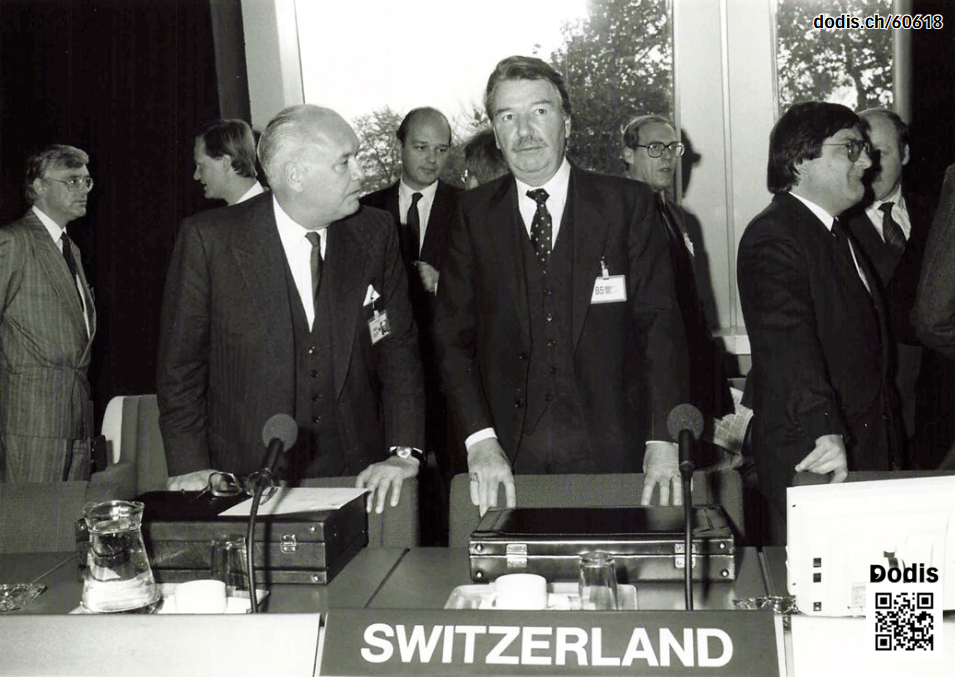Switzerland and the Council of Europe
When the Council of Europe was founded in 1949, there was no question of Switzerland joining for the Minister of Foreign Affairs, Federal Councillor Max Petitpierre (dodis.ch/5020). In his view, Switzerland’s policy of strict neutrality made it impossible for the country to participate in a «political» organisation. Switzerland’s involvement in the «technical» bodies of the Council of Europe led to a gradual rapprochement over the following years. As early as 1961, the Federal Assembly sent observers to Strasbourg; in 1962, the Federal Council submitted a report suggesting full membership (dodis.ch/32085).
«An excellent school for dialogue»
In January 1963, the President of the Confederation, Willy Spühler, was able to report to the Secretary General of the Council of Europe that the country’s government was delighted « that a new bond was about to be added to the many that traditionally unite our country with the other States of this continent » (dodis.ch/30487). Leading parliamentarians see membership as «strengthening Switzerland’s delicate position in Europe and the world». The Council of Europe is «an excellent school for initiating dialogue with other countries» (dodis.ch/30453).
«The logical consequence of our membership»: signature of the ECHR
Despite its membership, Switzerland initially refused to sign the Council of Europe’s most important instrument – the European Convention on Human Rights (ECHR). Although the Federal Council sees it as «an act of solidarity and the logical consequence of our membership» (dodis.ch/33123), reluctance is still too widespread. The situation only changed with the introduction of women’s right to vote in 1971 and the abolition of exceptional confessional articles in 1973. Switzerland signs the ECHR on 28 November 1974 (dodis.ch/39382).
Switzerland taken to court
Signing the Convention therefore makes it possible to bring an indictment against Switzerland before the European Court of Human Rights (ECHR). In the first nine years, 293 applications were lodged against Switzerland. In three cases, the Court found that Switzerland had violated the ECHR through its legal proceedings (dodis.ch/66551). The case of Jutta Huber against Switzerland caused a stir. Jutta Huber, a sex worker, was remanded in custody in 1983 during a police operation against the Hells Angels, without the case being examined by an independent judge. Huber saw this as a violation of her right to a fair trial under article 3 of the ECHR, and took her case to the Court, which confirmed the violation in 1990 and obliged Switzerland to bear the costs of the proceedings (dodis.ch/56217).
Ratification of the Social Charter still pending
Even more difficult than signing the ECHR was ratifying the 1961 European Social Charter, which added economic, social and cultural rights to the ECHR. Although the insufficient development of social insurance initially prevented signature, various parliamentary interventions put pressure on the Federal Council from 1970 onwards. After the Charter was signed on 6 May 1976 (dodis.ch/48718), it was not until 1983 that the Federal Council made its first attempt at ratification (dodis.ch/65769) – unsuccessfully. Its message was rejected in 1984 by the Council of States (dodis.ch/68883) and in 1987 by the National Council (dodis.ch/68884). To this day, Switzerland still has not ratified the European Social Charter.
Swiss Presidency of the Committee of Ministers
Despite this, Switzerland has played an active role in the Council of Europe since it became a member: between 1965 and 1991, four heads of the Federal Department of Foreign Affairs chaired its Committee of Ministers. In 1965, Federal Councillor Wahlen spoke out in favour of «European unity» (dodis.ch/68617), Federal Councillor Graber laid the foundation stone for the new Palais de l’Europe in 1972 (dodis.ch/68956) and in 1981, Federal Councillor Aubert, as President, made an important foreign policy statement on détente between East and West (dodis.ch/63386). Immediately after the end of the Cold War, the specific task of the Swiss presidency was to «integrate the new democracies of Central and Eastern Europe» and thus help the Council of Europe to fulfil its pan-European vocation (dodis.ch/58669). In February 1992, it was the presidency of the Council of Europe that enabled President Felber to hold a rare meeting with US-President George Bush at the White House (dodis.ch/59917).
An advisor rather than a Swiss General Secretary
In December 1993, Jura Councillor of State Michel Flückiger expressed his interest in running for the post of Secretary General of the Council of Europe. Parliament’s delegation to the Council of Europe reacted cautiously, however, stating that «a Swiss candidacy should only be announced if there is a reliable prospect of success» (dodis.ch/65289). Shortly afterwards, Flückiger noted Switzerland’s «immense solitude» and decided not to stand for election (dodis.ch/68059). However, the new Secretary General appointed Flückiger as his personal adviser on migration issues, and Switzerland contributed to the new adviser’s salary costs (dodis.ch/67732).
For Switzerland’s adhesion to the Council of Europe, see also dodis.ch/W1923.
